ENA - ENA English
Headlines
PM Abiy Launches Ethiopia’s First Unmanned Smart Police Service
Feb 9, 2026 91
Addis Ababa, February 9, 2026 (ENA)—Prime Minister Abiy Ahmed officially launched Ethiopia’s first-ever unmanned Smart Police Station System today, marking a major step in the country’s digital transformation of law enforcement. Announcing the launch in a social media post, the Prime Minister said the technology-driven service will allow citizens to access police services more quickly and efficiently through digital platforms. He noted that the smart police system will also enable law enforcement to respond rapidly to incidents, strengthen crime prevention efforts, and improve operational efficiency. According to the Prime Minister, the initiative is part of broader reforms aimed at modernizing law enforcement institutions and making them more competent and competitive under the the Digital Ethiopia 2030 strategy. “The launch of this service will enhance the effectiveness of the reform initiatives started to make law enforcement institutions competent and competitive under Digital Ethiopia 2030.” The introduction of the unmanned smart police service is expected to enhance public service delivery while integrating advanced technology into Ethiopia’s security sector.
Ethiopia, Dev’t Partners Renew Strategic Alliance for Inclusive Growth and Lasting Peace
Feb 9, 2026 217
Addis Ababa, February 9, 2026 (ENA)-The Government of Ethiopia and the Development Partners Group (DPG) today reaffirmed their commitment to inclusive growth, resilience, and sustainable peace at the High-Level Development Forum (HLDF) held in Addis Ababa, renewing a strategic, results-oriented partnership aligned with national priorities. The forum brought together senior government officials, ambassadors, development agencies, and international financial institutions at a critical juncture in Ethiopia’s reform journey. Discussions focused on two core pillars: inclusive and sustainable development, and the national dialogue and peacebuilding process. In it press release sent to ENA, Ethiopia continues to advance structural transformation through comprehensive macroeconomic and sectoral reforms, alongside nationwide peacebuilding efforts aimed at securing lasting stability. “Ethiopia remains firmly committed to inclusive development and sustainable peace through the full implementation of our reform agenda,” said Ahmed Shide, Minister of Finance. He highlighted the country’s strong economic performance, noting that real GDP growth has averaged seven percent over the past seven years, guided by the Ten-Year Development Plan and sustained investments in agriculture, manufacturing, infrastructure, digital transformation, human capital development, and green growth. Fitsum Assefa, Minister of Planning and Development, reported that Ethiopia recorded 9.2 percent economic growth in 2024/25 and is projected to reach 10.2 percent in 2025/26. “Sustainable development requires resilience, social cohesion, and strong national ownership,” she said, emphasizing the importance of predictable and strategic international partnerships during Ethiopia’s transition. Participants underscored that effective development cooperation must align with national priorities, strengthen delivery capacity, and ensure predictable support. The HLDF was reaffirmed as a trusted platform for coordination, transparency, and mutual accountability in advancing the Sustainable Development Goals. A dedicated peacebuilding session highlighted the central role of inclusive, nationally owned solutions. Mohammed Edris, Minister of Peace, described the National Dialogue as a national imperative and outlined Ethiopia’s peace agenda, anchored in dialogue, disarmament, demobilization and reintegration (DDR), and transitional justice. He also highlighted legal reforms aimed at expanding civic engagement and protecting freedom of expression. “Partnership in peacebuilding is partnership in Ethiopia’s future,” he said. The forum further emphasized the importance of governance reform, the rule of law, and civic participation in restoring trust and sustaining recovery. Participants called for stronger coherence across humanitarian, development, and peace efforts to address multidimensional risks. Gedion Timothewos, Minister of Foreign Affairs, briefed participants on Ethiopia’s preparations to host COP32 in 2027, describing the event as a major economic catalyst and a strategic opportunity to advance Africa’s climate agenda while mobilizing investment for resilience and green development. The Government of Ethiopia reaffirmed its commitment to effective development cooperation and mutual accountability, calling for multi-year predictable financing, strengthened reporting systems, and increased use of country-owned mechanisms. In closing, both the Government and development partners renewed their enduring partnership, focused on delivering measurable results that improve livelihoods, expand opportunities, and ensure that no one is left behind.
PM Abiy Urges Ethiopians to Extend Warm Welcome to AU Delegates
Feb 9, 2026 531
Addis Ababa, February 9, 2026 (ENA)- Prime Minister Abiy Ahmed has called on Ethiopians to warmly welcome African leaders and delegates as Addis Ababa prepares to host the 39th Ordinary Session of the African Union (AU) Summit. In a message shared on his social media platforms, the Prime Minister said Ethiopia is opening its doors to fellow Africans with a spirit rooted in history, dignity, and solidarity. “This week, our beloved homeland opens its arms to fellow Africans attending the AU meetings. These are friends who share the colors of our flag, who see Ethiopia as a beacon of freedom, and who regard our country as a cornerstone of political vision for the continent,” the Prime Minister stated. He said the summit offers Ethiopians an opportunity to demonstrate the culture of kindness and hospitality that defines the nation, urging citizens to ensure every visitor feels welcomed and respected. “Let’s show them why Ethiopia is known for its unmatched hospitality. Let’s make them feel at home, greet them with respect, and embrace them with love. Together, let’s honor the spirit of African unity that our flag represents and the shared dreams that connect us all,” he added. The 39th Ordinary Session of the Assembly of the African Union will take place from February 14 to 15, 2026, following the 48th Ordinary Session of the AU Executive Council scheduled for February 11 and 12. The summit is being held under the theme “Assuring Sustainable Water Availability and Safe Sanitation Systems to Achieve the Goals of Agenda 2063.” African leaders are expected to deliberate on key continental priorities, including climate resilience, peace and security, and accelerating economic integration through the African Continental Free Trade Area.
Ethiopia’s Urban Corridors Positioning Cities as Global Gateways: Ministry
Feb 9, 2026 368
Addis Ababa, February 8, 2026 (ENA) - The Ministry of Tourism affirmed that Ethiopia’s newly developed urban corridors are blending modern design with deep rooted cultural heritage, transforming Addis Ababa into a world class gateway for diplomats and tourists. According to the ministry, the largescale corridor developments are reshaping the capital’s urban landscape, offering visitors an experience that combines contemporary elegance with authentic Ethiopian identity. The initiative aims to leave a strong first impression on African Union delegates, international visitors, and investors arriving in the city. In an interview with the ENA, Teshome Teklu, Lead Executive for the Promotion Sector at the Ministry of Tourism, said the corridors are already enhancing Ethiopia’s global tourism appeal. “This transformative project doesn’t just redefine our city’s physical appearance, it strategically positions Ethiopia as a global tourism powerhouse,” he said. According to Teshome, the corridors have stimulated domestic tourism by making heritage sites, public spaces, and cultural attractions more accessible. Improved mobility and clear urban layouts, he noted, allow the country to offer visitors a more organized and welcoming environment. As Addis Ababa prepares to host major African Union meetings, visiting delegates are encountering more than a political center. Teshome said the capital now presents itself as a dynamic city where modern urban life coexists with deep historical character. He further emphasized that the growing number of visitors is generating tangible economic benefits, creating jobs in hospitality, retail, and service industries while strengthening local businesses. Beyond their transport function, the corridors have developed into active social and cultural spaces. Restaurants, boutique hotels, and artisan markets along the routes are attracting both residents and international guests, highlighting Ethiopia’s craftsmanship and culinary traditions. “These spaces buzz with life, inviting locals and visitors alike to connect, celebrate traditions, and share their stories,” Teshome added. The projects also emphasize community centered design. Pedestrian friendly walkways, green spaces, shaded areas, and modern public facilities are encouraging healthier and more connected urban lifestyles. Pocket parks and cultural installations provide calm spaces within busy city areas, supporting both physical and mental wellbeing, he added. Summing up the broader vision, Teshome said, “By intertwining leisure, culture, and mobility, we are crafting sustainable urban ecosystems where community vitality thrives in harmony.” The Ministry of Tourism believes this approach will ensure Addis Ababa’s long-term appeal as a destination for diplomacy, investment, and tourism, reinforcing Ethiopia’s image as a country undergoing confident and inclusive urban transformation.
Renowned Astronomer Praises Ethiopia’s Living Sanctuary of Ancient Astronomy
Feb 9, 2026 478
Addis Ababa, February 9, 2026 (ENA) - Ethiopia continues to serve as a living sanctuary for humanity’s oldest intellectual pursuit, astronomy, preserving a deep and diverse celestial heritage that remains relevant in the modern scientific world, according to astronomer Mirjana Pović. Speaking on Ethiopia’s cultural and scientific legacy, Pović, who is Sci Girls Project Coordinator and a senior researcher at the Space Science and Geospatial Institute, stated that Ethiopia has been actively practiced across generations and communities in maintaining its heritage. “In a world increasingly shaped by globalization and digital uniformity, Ethiopia stands out as a place where the study of the stars is still deeply rooted in culture and daily life,” she said. Pović noted that Ethiopia’s astronomical heritage is closely linked to the origins of humanity itself, describing it as a global treasure with scientific and cultural value. She said that Ethiopia possesses a remarkable heritage in the history of science and cultural astronomy, alongside many other fields, noting that from the dawn of humankind people have consistently sought answers to fundamental questions about human origins, the vastness of the universe, and the source of all existence. According to her, Ethiopia’s more than 80 ethnic groups contribute unique interpretations of the sky, each with distinct names for stars and constellations, offering rich perspectives on universal questions. This diversity, she explained, gives Ethiopia a rare depth in cultural astronomy found in few places worldwide. She also noted Ethiopia’s sophisticated understanding of time as a key example of this heritage. Beyond the globally known Ethiopian calendar, she said many communities rely on indigenous astronomical knowledge that predates modern technologies. “The astronomy, the cultural astronomy that is there, absolutely every single region, the fact that there are so many calendars that are there. Each different ethnic group has different names for the stars, constellations, and so on,” she explained. Pović stressed that much of this knowledge is still preserved by elders in the Ethiopian Orthodox Church, Muslim mosques and various ethnic communities, but warned that it risks being lost without urgent documentation. “What is really important is to document, to document that Ethiopia as a country, that knowledge that is there, and the heritage that is there, that is documented, so that it is not lost,” she said. Bridging generations is essential to ensure cultural astronomy continues to inspire future scientists and researchers. Beyond preservation, Pović pointed to the socio-economic potential of Ethiopia’s astronomical heritage, particularly in astrotourism. She said visitors could be drawn not only to historical and natural attractions but also to traditional villages where celestial stories are passed down orally. “It can also be used for visiting villages where people are counting the stories related with astronomy, because that’s a part of the unique heritage that Ethiopia has,” she noted.
Politics
PM Abiy Launches Ethiopia’s First Unmanned Smart Police Service
Feb 9, 2026 91
Addis Ababa, February 9, 2026 (ENA)—Prime Minister Abiy Ahmed officially launched Ethiopia’s first-ever unmanned Smart Police Station System today, marking a major step in the country’s digital transformation of law enforcement. Announcing the launch in a social media post, the Prime Minister said the technology-driven service will allow citizens to access police services more quickly and efficiently through digital platforms. He noted that the smart police system will also enable law enforcement to respond rapidly to incidents, strengthen crime prevention efforts, and improve operational efficiency. According to the Prime Minister, the initiative is part of broader reforms aimed at modernizing law enforcement institutions and making them more competent and competitive under the the Digital Ethiopia 2030 strategy. “The launch of this service will enhance the effectiveness of the reform initiatives started to make law enforcement institutions competent and competitive under Digital Ethiopia 2030.” The introduction of the unmanned smart police service is expected to enhance public service delivery while integrating advanced technology into Ethiopia’s security sector.
PM Abiy Urges Ethiopians to Extend Warm Welcome to AU Delegates
Feb 9, 2026 531
Addis Ababa, February 9, 2026 (ENA)- Prime Minister Abiy Ahmed has called on Ethiopians to warmly welcome African leaders and delegates as Addis Ababa prepares to host the 39th Ordinary Session of the African Union (AU) Summit. In a message shared on his social media platforms, the Prime Minister said Ethiopia is opening its doors to fellow Africans with a spirit rooted in history, dignity, and solidarity. “This week, our beloved homeland opens its arms to fellow Africans attending the AU meetings. These are friends who share the colors of our flag, who see Ethiopia as a beacon of freedom, and who regard our country as a cornerstone of political vision for the continent,” the Prime Minister stated. He said the summit offers Ethiopians an opportunity to demonstrate the culture of kindness and hospitality that defines the nation, urging citizens to ensure every visitor feels welcomed and respected. “Let’s show them why Ethiopia is known for its unmatched hospitality. Let’s make them feel at home, greet them with respect, and embrace them with love. Together, let’s honor the spirit of African unity that our flag represents and the shared dreams that connect us all,” he added. The 39th Ordinary Session of the Assembly of the African Union will take place from February 14 to 15, 2026, following the 48th Ordinary Session of the AU Executive Council scheduled for February 11 and 12. The summit is being held under the theme “Assuring Sustainable Water Availability and Safe Sanitation Systems to Achieve the Goals of Agenda 2063.” African leaders are expected to deliberate on key continental priorities, including climate resilience, peace and security, and accelerating economic integration through the African Continental Free Trade Area.
Addis Ababa Poised to Welcome AU Summit Delegates with Enhanced Hospitality
Feb 8, 2026 4529
Addis Ababa, February 8, 2026 (ENA)—Addis Ababa has finalized extensive preparations to host delegates attending the upcoming African Union (AU) Summit, as the city continues a sweeping urban transformation aimed at strengthening its role as Africa’s diplomatic capital. The Ordinary Session of the Executive Council of the African Union will take place from 11 to 12 February 2026, followed by the Italy–Africa Summit on 13 February, and the AU Summit on 14 and 15 February 2026. The city’s readiness comes amid wide-ranging development initiatives, including major corridor projects, riverside rehabilitation, upgraded road networks, and expanded hospitality and conference infrastructure. Over the past four years, key transport corridors across the capital have been developed or upgraded, easing traffic congestion and significantly improving urban mobility. In parallel, riverside rehabilitation projects have transformed sections of riverbanks into vibrant green public spaces, incorporating pedestrian walkways and recreational areas. These initiatives have enhanced environmental conditions while significantly improving Addis Ababa’s urban aesthetics. The city’s hospitality sector has also experienced rapid growth in recent years, with the addition of new hotels and serviced apartments, increasing overall accommodation capacity. Meanwhile, the modernization and expansion of convention centers have further strengthened Addis Ababa’s ability to host large-scale continental and international events. These developments form part of Ethiopia’s broader strategy to reposition Addis Ababa as a modern hub for diplomacy, business, and tourism, while preserving its historic role as the political capital of Africa. In this regard, the Addis Ababa Hotel Owners Association has emphasized that hotels across the capital are fully prepared to ensure a comfortable and high-quality experience for summit participants. Approached by the Ethiopian News Agency, Aster Solomon, President of the Addis Ababa Hotel Owners Association, said hotels are ready to deliver services rooted in Ethiopia’s long-standing tradition of hospitality. “Several hotels in Addis Ababa are prepared to offer genuine hospitality services to participants of the upcoming AU sessions,” she said, noting that both established and newly opened hotels have completed their preparations. She added that the expansion and modernization of convention centers have significantly enhanced the city’s capacity to host major international gatherings, a development reflected in the steady growth of Meetings, Incentives, Conferences, and Exhibitions (MICE) tourism. “The increasing number of international and continental events hosted in Addis Ababa demonstrates the city’s remarkable progress in MICE tourism,” Aster said. As the headquarters of numerous international and continental institutions, Addis Ababa regularly hosts high-level conferences, diplomatic meetings, and multilateral summits, making it a preferred destination for business and diplomatic tourism. According to Aster, more than 50 international and continental events were held in the city within a six-month period last year alone. She noted that hotels have not only finalized their preparations but are also eager to deliver services that meet international standards. “Addis Ababa has a long history of hosting AU summits. Building on this experience, hotels are offering tailored service packages for this year’s guests,” she said. Aster also highlighted the city’s visible transformation through corridor development projects, riverside revitalization, and the creation of new recreational and tourist destinations. “Addis Ababa has been beautified more than ever before,” she said, adding that the improvements will allow delegates to enjoy their stay and encourage them to extend their visits beyond official meetings. To this end, hotels are working closely with tour operators to offer curated tour packages showcasing the city’s cultural, historical, and contemporary attractions. “Visitors who were familiar with Addis Ababa in the past are genuinely surprised by the city’s dramatic transformation,” Aster said. She further noted that this year’s AU Summit participants will be excited by Addis Ababa’s new face. Addis Ababa has consistently demonstrated its capacity to host high-profile regional and global gatherings, citing the Second Africa–Caribbean Community Summit held in September 2025 as a recent example, according to Aster. Looking ahead, Addis Ababa is also set to host the 32nd Conference of the Parties (COP32) of the United Nations Framework Convention on Climate Change in 2027, underscoring the city’s growing stature as a leading international conference destination.
Brazilian Ambassador Lauds Rapid Transformation of Addis Ababa
Feb 8, 2026 1940
Addis Ababa, February 8, 2026 (ENA)—Brazil's Ambassador to Ethiopia, Jandyr Ferreira dos Santos, has commended Addis Ababa’s rapid transformation at the time when the diplomatic capital of Africa is gearing up to host the African Unions Heads of State and Government Summit next week. In an exclusive interview with ENA, the Ambassador commended the transformation of Addis Ababa, the diplomatic capital of Africa, which is going to host the African Union Heads of State and Government Summit. “I have been here long enough to witness this transformation of Addis Ababa, such a beautiful city; and how modern and beautiful it is becoming,” he stated. Ambassador Jandyr Ferreira dos Santo said, Ethiopia is a diplomatic capital of Africa, adding that but not only of Africa. “I think all global issues pass through Ethiopia. We discuss trade and political issues, for instance. Ethiopia is going to host COP 32 in 2027.” Ethiopia is preparing itself very well to receive dozens of African heads of state and government and host next week's African Union summit, the Ambassador noted, stating that this is a good opportunity for African heads of state and government to witness the transformation of the capital. “I think they all should be proud of the way this government is doing; and then transforming the city, making it for better living for the people, and making it more modern and developed.” For the Ambassador, this is what all major capitals in the world did and that is what happened here. He further pointed out that the city is evolving and changing with a fast pace as more things are offered: parks, gastronomy, and development. Noting about the daily direct flight from Ethiopia to Brazil, he said the government has been promoting for Brazilians who pass through Addis to come and stay and see the beauty of the city, even in a stopover. “So I am sure more and more Brazilians will come and see this. And we also want Ethiopians to come and visit Brazil. That is what we do as diplomats, build bridges.” Ambassador Jandyr Ferreira dos Santo urged the private sector and tourists to cross these bridges and visit Ethiopia, the Land of Origins, and the vibrant city Addis Ababa.
Nat'l Dialogue, Upcoming Election Foster Democratic Culture in Ethiopia, Says MP Ambassador Dina
Feb 7, 2026 1223
Addis Ababa, February 7, 2026 (ENA)—Ethiopia’s nationwide reconciliations process and the forthcoming seventh national election are crucial to fostering democratic values and a culture of civil politics across the country, Ambassador Dina Mufti said. Speaking to ENA, a member of the Foreign Relations and Peace Affairs Standing Committee of the House of Peoples’ Representatives, Ambassador Dina noted that the National Dialogue initiative is designed to ease political polarization and bring together diverse viewpoints to address longstanding differences among Ethiopians. He added that preparations for the general election, scheduled for June 1, 2026, are progressing steadily. According to the ambassador, the Ethiopian National Dialogue Commission (ENDC) has been actively engaging communities nationwide, collecting public views and opinions to encourage constructive discussions on national issues. He said the insights gathered will soon be consolidated into a public agenda, allowing citizens to collectively examine and address the root causes of divisions. “The national dialogue process plays a critical role in enhancing democratic culture by helping society resolve differences in a civilized manner,” Ambassador Dina said. He added: “Dialogue is a core principle of democracy. The Commission is creating a conducive environment where citizens can freely express their ideas and work toward viable solutions.” On the upcoming election, Ambassador Dina said the National Election Board of Ethiopia is working to ensure the process is democratic, transparent, and inclusive. He expressed optimism that the election will be conducted peacefully with the active participation of all stakeholders. “We expect a calm electoral environment supported by broad engagement from political actors and the public,” he said, emphasizing that transparency and inclusive participation are essential for ensuring the election contributes to a stable and prosperous Ethiopia. In a recent address to the House of Peoples’ Representatives, Prime Minister Abiy Ahmed underscored the importance of shifting Ethiopia’s political culture from confrontation to dialogue. Dina observed that Ethiopians have historically relied on force rather than discussion to resolve disagreements—a tendency he said has undermined lasting peace and national unity. The Prime Minister explained that this confrontational mindset often begins at the family level and later shapes political and social behavior, eventually fueling broader national conflicts. He stressed that sustainable peace requires transforming political culture and social norms by prioritizing dialogue, trust, and mutual understanding. Calling on the current generation to seize what he described as a historic opportunity, Prime Minister Abiy urged Ethiopians to build the nation through inclusive national dialogue. He also reaffirmed the government’s commitment to ensuring that this year’s election is peaceful, fair, and inclusive. “With regard to the election, my message to the Ethiopian people is: let us judge it by the results,” the Prime Minister said. “I can state with confidence that this parliament will be a place where diverse voices are heard in many ways.”
National Dialogue Commission Marks Major Progress in Agenda Collection
Feb 6, 2026 1179
Addis Ababa, February 6, 2026 (ENA)—The Ethiopian National Dialogue Commission (ENDC) has reached a significant milestone by completing the collection and identification of key agendas for the upcoming national dialogue process. In an exclusive interview with ENA, ENDC spokesperson Tibebu Tadesse emphasized the Commission’s dedication to addressing ideological divisions and longstanding grievances through peaceful, dialogue-based engagement. “These initiatives are vital for fostering national consensus and fortifying the foundations of a robust state,” he added. The Commission has prioritized inclusivity, ensuring every sector of society has a voice, Tibebu noted, adding that the agenda gathering was conducted extensively across the federal government, all regional states, the two city administrations, and notably among the Ethiopian diaspora. Beyond compiling diverse viewpoints, the Commission has progressed in shaping core themes and selecting participants for the main dialogue sessions. Tibebu further pointed out that the platforms established so far encourage transparency and allow participants to share their views openly. According to him, this historic process presents a critical opportunity to address the root causes of national divisions and work toward a more unified future for Ethiopia.
ENDC Driving Shift Toward Dialogue Based Political Culture
Feb 6, 2026 1104
Addis Ababa, February 6, 2026 (ENA)—The Ethiopian National Dialogue Commission (ENDC) is playing a decisive role in reshaping the country’s political culture by promoting dialogue, inclusion and reconciliation, Democracy Affairs Standing Committee Chairperson at the House of Peoples’ Representatives Ewnetu Alene said. The Commission presented its overall performance and upcoming activities to the Democracy Affairs Standing Committee where lawmakers reviewed progress made so far in advancing the national dialogue process. Addressing the session, Ewnetu commended the Commission for what he described as groundbreaking efforts to move Ethiopia away from confrontational politics toward constructive engagement. ENDC has emerged as a vital agent of change in a country long affected by political tensions, he added. “The work of the Commission marks a clear break from decades of divisive political practices and helps lay the foundation for a culture rooted in dialogue and reconciliation,” he stated. Ewnetu further stressed that the national dialogue process is a key pathway toward a more unified and democratic Ethiopia, urging the Commission to conclude its remaining tasks within the planned timeframe. He also called on groups yet to participate, particularly stakeholders in the Tigray region, to join the process and make use of what he termed a golden opportunity. For his part, ENDC Chief Commissioner Mesfin Araya said the agenda gathering and identification process has been completed in 11 regional states and two city administrations, reaching 93 percent overall participation. He noted that the process remains pending in the Tigray region and in four districts of the Amhara region. Mesfin emphasized that the dialogue process has been inclusive, engaging diverse segments of society to ensure broad representation at the forthcoming national dialogue conference. He further disclosed that the Commission has selected 170 dialogue facilitators to lead the conference, scheduled for the coming months, while continuing outreach efforts to remaining groups and stakeholders in the Tigray region.
Prime Minister Abiy Receives Warm Welcome at Kombolcha Airport
Feb 6, 2026 1229
Addis Ababa, February 6, 2026 (ENA)—Prime Minister Abiy Ahmed, accompanied by First Lady Zinash Tayachew, arrived today at Kombolcha Airport in the Amhara Region, where they were accorded a warm and respectful reception. Upon arrival at Wollo Kombolcha Airport, community elders welcomed the Prime Minister and the First Lady with traditional blessings, symbolizing goodwill, unity, and respect.
Politics
PM Abiy Launches Ethiopia’s First Unmanned Smart Police Service
Feb 9, 2026 91
Addis Ababa, February 9, 2026 (ENA)—Prime Minister Abiy Ahmed officially launched Ethiopia’s first-ever unmanned Smart Police Station System today, marking a major step in the country’s digital transformation of law enforcement. Announcing the launch in a social media post, the Prime Minister said the technology-driven service will allow citizens to access police services more quickly and efficiently through digital platforms. He noted that the smart police system will also enable law enforcement to respond rapidly to incidents, strengthen crime prevention efforts, and improve operational efficiency. According to the Prime Minister, the initiative is part of broader reforms aimed at modernizing law enforcement institutions and making them more competent and competitive under the the Digital Ethiopia 2030 strategy. “The launch of this service will enhance the effectiveness of the reform initiatives started to make law enforcement institutions competent and competitive under Digital Ethiopia 2030.” The introduction of the unmanned smart police service is expected to enhance public service delivery while integrating advanced technology into Ethiopia’s security sector.
PM Abiy Urges Ethiopians to Extend Warm Welcome to AU Delegates
Feb 9, 2026 531
Addis Ababa, February 9, 2026 (ENA)- Prime Minister Abiy Ahmed has called on Ethiopians to warmly welcome African leaders and delegates as Addis Ababa prepares to host the 39th Ordinary Session of the African Union (AU) Summit. In a message shared on his social media platforms, the Prime Minister said Ethiopia is opening its doors to fellow Africans with a spirit rooted in history, dignity, and solidarity. “This week, our beloved homeland opens its arms to fellow Africans attending the AU meetings. These are friends who share the colors of our flag, who see Ethiopia as a beacon of freedom, and who regard our country as a cornerstone of political vision for the continent,” the Prime Minister stated. He said the summit offers Ethiopians an opportunity to demonstrate the culture of kindness and hospitality that defines the nation, urging citizens to ensure every visitor feels welcomed and respected. “Let’s show them why Ethiopia is known for its unmatched hospitality. Let’s make them feel at home, greet them with respect, and embrace them with love. Together, let’s honor the spirit of African unity that our flag represents and the shared dreams that connect us all,” he added. The 39th Ordinary Session of the Assembly of the African Union will take place from February 14 to 15, 2026, following the 48th Ordinary Session of the AU Executive Council scheduled for February 11 and 12. The summit is being held under the theme “Assuring Sustainable Water Availability and Safe Sanitation Systems to Achieve the Goals of Agenda 2063.” African leaders are expected to deliberate on key continental priorities, including climate resilience, peace and security, and accelerating economic integration through the African Continental Free Trade Area.
Addis Ababa Poised to Welcome AU Summit Delegates with Enhanced Hospitality
Feb 8, 2026 4529
Addis Ababa, February 8, 2026 (ENA)—Addis Ababa has finalized extensive preparations to host delegates attending the upcoming African Union (AU) Summit, as the city continues a sweeping urban transformation aimed at strengthening its role as Africa’s diplomatic capital. The Ordinary Session of the Executive Council of the African Union will take place from 11 to 12 February 2026, followed by the Italy–Africa Summit on 13 February, and the AU Summit on 14 and 15 February 2026. The city’s readiness comes amid wide-ranging development initiatives, including major corridor projects, riverside rehabilitation, upgraded road networks, and expanded hospitality and conference infrastructure. Over the past four years, key transport corridors across the capital have been developed or upgraded, easing traffic congestion and significantly improving urban mobility. In parallel, riverside rehabilitation projects have transformed sections of riverbanks into vibrant green public spaces, incorporating pedestrian walkways and recreational areas. These initiatives have enhanced environmental conditions while significantly improving Addis Ababa’s urban aesthetics. The city’s hospitality sector has also experienced rapid growth in recent years, with the addition of new hotels and serviced apartments, increasing overall accommodation capacity. Meanwhile, the modernization and expansion of convention centers have further strengthened Addis Ababa’s ability to host large-scale continental and international events. These developments form part of Ethiopia’s broader strategy to reposition Addis Ababa as a modern hub for diplomacy, business, and tourism, while preserving its historic role as the political capital of Africa. In this regard, the Addis Ababa Hotel Owners Association has emphasized that hotels across the capital are fully prepared to ensure a comfortable and high-quality experience for summit participants. Approached by the Ethiopian News Agency, Aster Solomon, President of the Addis Ababa Hotel Owners Association, said hotels are ready to deliver services rooted in Ethiopia’s long-standing tradition of hospitality. “Several hotels in Addis Ababa are prepared to offer genuine hospitality services to participants of the upcoming AU sessions,” she said, noting that both established and newly opened hotels have completed their preparations. She added that the expansion and modernization of convention centers have significantly enhanced the city’s capacity to host major international gatherings, a development reflected in the steady growth of Meetings, Incentives, Conferences, and Exhibitions (MICE) tourism. “The increasing number of international and continental events hosted in Addis Ababa demonstrates the city’s remarkable progress in MICE tourism,” Aster said. As the headquarters of numerous international and continental institutions, Addis Ababa regularly hosts high-level conferences, diplomatic meetings, and multilateral summits, making it a preferred destination for business and diplomatic tourism. According to Aster, more than 50 international and continental events were held in the city within a six-month period last year alone. She noted that hotels have not only finalized their preparations but are also eager to deliver services that meet international standards. “Addis Ababa has a long history of hosting AU summits. Building on this experience, hotels are offering tailored service packages for this year’s guests,” she said. Aster also highlighted the city’s visible transformation through corridor development projects, riverside revitalization, and the creation of new recreational and tourist destinations. “Addis Ababa has been beautified more than ever before,” she said, adding that the improvements will allow delegates to enjoy their stay and encourage them to extend their visits beyond official meetings. To this end, hotels are working closely with tour operators to offer curated tour packages showcasing the city’s cultural, historical, and contemporary attractions. “Visitors who were familiar with Addis Ababa in the past are genuinely surprised by the city’s dramatic transformation,” Aster said. She further noted that this year’s AU Summit participants will be excited by Addis Ababa’s new face. Addis Ababa has consistently demonstrated its capacity to host high-profile regional and global gatherings, citing the Second Africa–Caribbean Community Summit held in September 2025 as a recent example, according to Aster. Looking ahead, Addis Ababa is also set to host the 32nd Conference of the Parties (COP32) of the United Nations Framework Convention on Climate Change in 2027, underscoring the city’s growing stature as a leading international conference destination.
Brazilian Ambassador Lauds Rapid Transformation of Addis Ababa
Feb 8, 2026 1940
Addis Ababa, February 8, 2026 (ENA)—Brazil's Ambassador to Ethiopia, Jandyr Ferreira dos Santos, has commended Addis Ababa’s rapid transformation at the time when the diplomatic capital of Africa is gearing up to host the African Unions Heads of State and Government Summit next week. In an exclusive interview with ENA, the Ambassador commended the transformation of Addis Ababa, the diplomatic capital of Africa, which is going to host the African Union Heads of State and Government Summit. “I have been here long enough to witness this transformation of Addis Ababa, such a beautiful city; and how modern and beautiful it is becoming,” he stated. Ambassador Jandyr Ferreira dos Santo said, Ethiopia is a diplomatic capital of Africa, adding that but not only of Africa. “I think all global issues pass through Ethiopia. We discuss trade and political issues, for instance. Ethiopia is going to host COP 32 in 2027.” Ethiopia is preparing itself very well to receive dozens of African heads of state and government and host next week's African Union summit, the Ambassador noted, stating that this is a good opportunity for African heads of state and government to witness the transformation of the capital. “I think they all should be proud of the way this government is doing; and then transforming the city, making it for better living for the people, and making it more modern and developed.” For the Ambassador, this is what all major capitals in the world did and that is what happened here. He further pointed out that the city is evolving and changing with a fast pace as more things are offered: parks, gastronomy, and development. Noting about the daily direct flight from Ethiopia to Brazil, he said the government has been promoting for Brazilians who pass through Addis to come and stay and see the beauty of the city, even in a stopover. “So I am sure more and more Brazilians will come and see this. And we also want Ethiopians to come and visit Brazil. That is what we do as diplomats, build bridges.” Ambassador Jandyr Ferreira dos Santo urged the private sector and tourists to cross these bridges and visit Ethiopia, the Land of Origins, and the vibrant city Addis Ababa.
Nat'l Dialogue, Upcoming Election Foster Democratic Culture in Ethiopia, Says MP Ambassador Dina
Feb 7, 2026 1223
Addis Ababa, February 7, 2026 (ENA)—Ethiopia’s nationwide reconciliations process and the forthcoming seventh national election are crucial to fostering democratic values and a culture of civil politics across the country, Ambassador Dina Mufti said. Speaking to ENA, a member of the Foreign Relations and Peace Affairs Standing Committee of the House of Peoples’ Representatives, Ambassador Dina noted that the National Dialogue initiative is designed to ease political polarization and bring together diverse viewpoints to address longstanding differences among Ethiopians. He added that preparations for the general election, scheduled for June 1, 2026, are progressing steadily. According to the ambassador, the Ethiopian National Dialogue Commission (ENDC) has been actively engaging communities nationwide, collecting public views and opinions to encourage constructive discussions on national issues. He said the insights gathered will soon be consolidated into a public agenda, allowing citizens to collectively examine and address the root causes of divisions. “The national dialogue process plays a critical role in enhancing democratic culture by helping society resolve differences in a civilized manner,” Ambassador Dina said. He added: “Dialogue is a core principle of democracy. The Commission is creating a conducive environment where citizens can freely express their ideas and work toward viable solutions.” On the upcoming election, Ambassador Dina said the National Election Board of Ethiopia is working to ensure the process is democratic, transparent, and inclusive. He expressed optimism that the election will be conducted peacefully with the active participation of all stakeholders. “We expect a calm electoral environment supported by broad engagement from political actors and the public,” he said, emphasizing that transparency and inclusive participation are essential for ensuring the election contributes to a stable and prosperous Ethiopia. In a recent address to the House of Peoples’ Representatives, Prime Minister Abiy Ahmed underscored the importance of shifting Ethiopia’s political culture from confrontation to dialogue. Dina observed that Ethiopians have historically relied on force rather than discussion to resolve disagreements—a tendency he said has undermined lasting peace and national unity. The Prime Minister explained that this confrontational mindset often begins at the family level and later shapes political and social behavior, eventually fueling broader national conflicts. He stressed that sustainable peace requires transforming political culture and social norms by prioritizing dialogue, trust, and mutual understanding. Calling on the current generation to seize what he described as a historic opportunity, Prime Minister Abiy urged Ethiopians to build the nation through inclusive national dialogue. He also reaffirmed the government’s commitment to ensuring that this year’s election is peaceful, fair, and inclusive. “With regard to the election, my message to the Ethiopian people is: let us judge it by the results,” the Prime Minister said. “I can state with confidence that this parliament will be a place where diverse voices are heard in many ways.”
National Dialogue Commission Marks Major Progress in Agenda Collection
Feb 6, 2026 1179
Addis Ababa, February 6, 2026 (ENA)—The Ethiopian National Dialogue Commission (ENDC) has reached a significant milestone by completing the collection and identification of key agendas for the upcoming national dialogue process. In an exclusive interview with ENA, ENDC spokesperson Tibebu Tadesse emphasized the Commission’s dedication to addressing ideological divisions and longstanding grievances through peaceful, dialogue-based engagement. “These initiatives are vital for fostering national consensus and fortifying the foundations of a robust state,” he added. The Commission has prioritized inclusivity, ensuring every sector of society has a voice, Tibebu noted, adding that the agenda gathering was conducted extensively across the federal government, all regional states, the two city administrations, and notably among the Ethiopian diaspora. Beyond compiling diverse viewpoints, the Commission has progressed in shaping core themes and selecting participants for the main dialogue sessions. Tibebu further pointed out that the platforms established so far encourage transparency and allow participants to share their views openly. According to him, this historic process presents a critical opportunity to address the root causes of national divisions and work toward a more unified future for Ethiopia.
ENDC Driving Shift Toward Dialogue Based Political Culture
Feb 6, 2026 1104
Addis Ababa, February 6, 2026 (ENA)—The Ethiopian National Dialogue Commission (ENDC) is playing a decisive role in reshaping the country’s political culture by promoting dialogue, inclusion and reconciliation, Democracy Affairs Standing Committee Chairperson at the House of Peoples’ Representatives Ewnetu Alene said. The Commission presented its overall performance and upcoming activities to the Democracy Affairs Standing Committee where lawmakers reviewed progress made so far in advancing the national dialogue process. Addressing the session, Ewnetu commended the Commission for what he described as groundbreaking efforts to move Ethiopia away from confrontational politics toward constructive engagement. ENDC has emerged as a vital agent of change in a country long affected by political tensions, he added. “The work of the Commission marks a clear break from decades of divisive political practices and helps lay the foundation for a culture rooted in dialogue and reconciliation,” he stated. Ewnetu further stressed that the national dialogue process is a key pathway toward a more unified and democratic Ethiopia, urging the Commission to conclude its remaining tasks within the planned timeframe. He also called on groups yet to participate, particularly stakeholders in the Tigray region, to join the process and make use of what he termed a golden opportunity. For his part, ENDC Chief Commissioner Mesfin Araya said the agenda gathering and identification process has been completed in 11 regional states and two city administrations, reaching 93 percent overall participation. He noted that the process remains pending in the Tigray region and in four districts of the Amhara region. Mesfin emphasized that the dialogue process has been inclusive, engaging diverse segments of society to ensure broad representation at the forthcoming national dialogue conference. He further disclosed that the Commission has selected 170 dialogue facilitators to lead the conference, scheduled for the coming months, while continuing outreach efforts to remaining groups and stakeholders in the Tigray region.
Prime Minister Abiy Receives Warm Welcome at Kombolcha Airport
Feb 6, 2026 1229
Addis Ababa, February 6, 2026 (ENA)—Prime Minister Abiy Ahmed, accompanied by First Lady Zinash Tayachew, arrived today at Kombolcha Airport in the Amhara Region, where they were accorded a warm and respectful reception. Upon arrival at Wollo Kombolcha Airport, community elders welcomed the Prime Minister and the First Lady with traditional blessings, symbolizing goodwill, unity, and respect.
Social
Renowned Astronomer Praises Ethiopia’s Living Sanctuary of Ancient Astronomy
Feb 9, 2026 478
Addis Ababa, February 9, 2026 (ENA) - Ethiopia continues to serve as a living sanctuary for humanity’s oldest intellectual pursuit, astronomy, preserving a deep and diverse celestial heritage that remains relevant in the modern scientific world, according to astronomer Mirjana Pović. Speaking on Ethiopia’s cultural and scientific legacy, Pović, who is Sci Girls Project Coordinator and a senior researcher at the Space Science and Geospatial Institute, stated that Ethiopia has been actively practiced across generations and communities in maintaining its heritage. “In a world increasingly shaped by globalization and digital uniformity, Ethiopia stands out as a place where the study of the stars is still deeply rooted in culture and daily life,” she said. Pović noted that Ethiopia’s astronomical heritage is closely linked to the origins of humanity itself, describing it as a global treasure with scientific and cultural value. She said that Ethiopia possesses a remarkable heritage in the history of science and cultural astronomy, alongside many other fields, noting that from the dawn of humankind people have consistently sought answers to fundamental questions about human origins, the vastness of the universe, and the source of all existence. According to her, Ethiopia’s more than 80 ethnic groups contribute unique interpretations of the sky, each with distinct names for stars and constellations, offering rich perspectives on universal questions. This diversity, she explained, gives Ethiopia a rare depth in cultural astronomy found in few places worldwide. She also noted Ethiopia’s sophisticated understanding of time as a key example of this heritage. Beyond the globally known Ethiopian calendar, she said many communities rely on indigenous astronomical knowledge that predates modern technologies. “The astronomy, the cultural astronomy that is there, absolutely every single region, the fact that there are so many calendars that are there. Each different ethnic group has different names for the stars, constellations, and so on,” she explained. Pović stressed that much of this knowledge is still preserved by elders in the Ethiopian Orthodox Church, Muslim mosques and various ethnic communities, but warned that it risks being lost without urgent documentation. “What is really important is to document, to document that Ethiopia as a country, that knowledge that is there, and the heritage that is there, that is documented, so that it is not lost,” she said. Bridging generations is essential to ensure cultural astronomy continues to inspire future scientists and researchers. Beyond preservation, Pović pointed to the socio-economic potential of Ethiopia’s astronomical heritage, particularly in astrotourism. She said visitors could be drawn not only to historical and natural attractions but also to traditional villages where celestial stories are passed down orally. “It can also be used for visiting villages where people are counting the stories related with astronomy, because that’s a part of the unique heritage that Ethiopia has,” she noted.
African Sexual and Reproductive Health Conference Underway in Addis Ababa
Feb 7, 2026 1518
Addis Ababa, February 7, 2026 (ENA)—A joint annual conference of the Ethiopian Society of Obstetricians and Gynecologists (ESOG) and the African Federation of Obstetrics and Gynecology (AFOG) is underway at the Hilton Addis in Addis Ababa. The ESOG and AFOG conference which has drawn participants from 20 African countries and 150 delegates across the globe, focuses on advancing reproductive health and strengthening professional capacity across Africa. Opening the two-day conference, State Minister Dr. Dereje Duguma said the Government of Ethiopia has achieved remarkable progress in reproductive and maternal health care but challenges and opportunities are waiting ahead. According to him, Sexual and Reproductive Healthcare is the central part of the health system in Ethiopia. Sexual reproductive health addresses equity in different parts of the country and it addresses the gaps in the health service provision and acceptance of women and young girls, he added. Some of the lessons that Ethiopia shares to the global community is its success in Sexual and Reproductive Health over the last many years, he said mentioning the rise of life expectancy from 65 to 68 over the last 5 years and decline of maternal mortality to 141 out of 100,00 births. Ethiopian Society of Obstetricians and Gynecologists President, Dr. Hailemariam Segni, said when we talk about sexual and productive health in Africa, we need to first start with celebrating our progress. We have generally made progress in Africa, and specifically in Ethiopia. Yet, we should not forget the challenges we have because even though maternal mortality ratio has significantly dropped, there are still mothers dying from preventable causes across Africa, he added. To addresses the remaining challenges, the President stressed the need for a resilient health system that by default will have a resilient sexual and proactive health system. Dr. Hailemariam finally called for the need to embrace innovation that is context specific, sustainable, and scalable. African Federation of Obstetrics and Gynecology president, Dr. Sami Mohamoud Abdelkair, said on his part that the Federation is very grateful to the Ethiopian Society of Obstetricians and Gynecologists for its kind invitation to the scientific program. ''Many Africans from our mother continent and from diaspora are now in this international conference,'' he noted. He expressed his hope that the conference will reach a consensus to help mothers and newborns in Africa.
Ethiopia Modernizes Visa-on-Arrival Ahead of AU Summit
Feb 7, 2026 3650
Addis Ababa, February 7, 2026 (ENA)—Ethiopia has unveiled a streamlined visa-on-arrival process at Bole International Airport, designed to enhance national security while providing a seamless experience for international travelers. The reforms, announced by the Immigration and Citizenship Service (ICS), come ahead of the 39th African Union Summit. Gosa Demissie, Deputy Director General of ICS, explained that the upgraded service now covers arrival and exit visas, specialized passenger assistance, and dedicated support for international flight crews. “Previously, foreign nationals faced wait times exceeding two hours,” he said. “After implementing 11 reform measures over three years, processing now takes only minutes thanks to advanced technology and specialized staff training.” Over the past 18 months, more than 240 professionals have been deployed to support the new system. The improvements aim to meet international security standards while boosting the global competitiveness of Ethiopian Airlines. Travelers have praised the changes. Mamwelaze Koma from Lesotho said, “Wow, I got amazing service and felt very welcome. This is my first time in Ethiopia and the service is just business class. It was quick, seamless, and very professional.” Returning visitor Mavis Anima Bonsu from Ghana also noted the transformation. “There is a massive change. It is stricter, more automated, and much faster. I was prepared to wait, but the system is well improved. I congratulate the government of Ethiopia for this initiative.” Brazilian traveler Pedro Lacaz Amaral added, “They were very kind and very fast. It took only five minutes to process my passport, invitation letter, and visa payment. I am very impressed.” Hirut Assefa, a Toronto resident originally from Ethiopia, described the upgraded system as world-class. She emphasized the dedicated staff and technology that help travelers avoid long lines, expressing hope that the improvements will attract more visitors, boost the economy, and showcase Ethiopia’s rich cultural heritage. The digital visa upgrade reflects Ethiopia’s commitment to modernizing border control and positioning itself as a premier destination for international events and tourism.
PM Abiy Reaffirms Government Commitment to IDPs Return
Feb 3, 2026 1141
Addis Ababa, February 3, 2026 (ENA)—The federal government is committed toward resettling the internally displaced people (IDPs) in northern Ethiopia, Prime Minister Abiy Ahmed said today. Responding to questions from members of the House of People's Representatives, he underscored that Ethiopians have the right to move freely and live anywhere they want. "Ethiopians have the right to choose where they live; and this is enshrined in the constitution," he noted. The premier, who commended the Pretoria Agreement signed to resolve the conflict in Tigray as a "great solution", urged full adherence to the agreement. In accordance with the agreement, the federal government has restored telecom, airlines, banks, electricity, and budgets in Tigray, he noted. The Prime Minister criticized those who take advantage of displacement for political reasons, comparing them to farmers who wait for crops while causing trouble. "Just like farmers that wait for crops to grow, some people intentionally create problems and hardships. They then ask for help, saying, 'You won't ever return to how things were before. ' Some groups use the suffering of the displaced people for their own benefit. " Talking about the disagreement over Wolkait, where Amhara and Tigray both claim ownership, the premier stated that this situation has kept the people of Wolkait from getting the budget they deserve and face other problems. He, therefore, urged the "brotherly peoples" to sort out their issues peacefully. The PM promised full support from the federal government for those returning to Wolkait, similar to what worked in Tselemet, Raya, and Ilubabor. "Let our people go back to their villages, help the displaced return home, and have political conversations. We must not cause pain to our people because of their ethnic background, " he noted. PM Abiy stressed that "the people in Tigray need peace and growth. They want to move away from the current confusion and, like other regions, improve their lives through hard work". He further called on the people of Tigray to move away from proxy politics and dream of a changed Mekelle that could compete with Jigjiga or Bahir Dar. "Think of Mekelle transformed into something like Jigjiga or Bahir Dar. It could become a new Addis Ababa. Every city gets equal support and resources, but without new ideas, progress will slow down. " Finally, the premier stated his belief that the people of Tigray should be empowered and become active players. But, "if we cling to the same old thinking, we stand to lose everything”, he concluded.
Economy
Ethiopia, Dev’t Partners Renew Strategic Alliance for Inclusive Growth and Lasting Peace
Feb 9, 2026 217
Addis Ababa, February 9, 2026 (ENA)-The Government of Ethiopia and the Development Partners Group (DPG) today reaffirmed their commitment to inclusive growth, resilience, and sustainable peace at the High-Level Development Forum (HLDF) held in Addis Ababa, renewing a strategic, results-oriented partnership aligned with national priorities. The forum brought together senior government officials, ambassadors, development agencies, and international financial institutions at a critical juncture in Ethiopia’s reform journey. Discussions focused on two core pillars: inclusive and sustainable development, and the national dialogue and peacebuilding process. In it press release sent to ENA, Ethiopia continues to advance structural transformation through comprehensive macroeconomic and sectoral reforms, alongside nationwide peacebuilding efforts aimed at securing lasting stability. “Ethiopia remains firmly committed to inclusive development and sustainable peace through the full implementation of our reform agenda,” said Ahmed Shide, Minister of Finance. He highlighted the country’s strong economic performance, noting that real GDP growth has averaged seven percent over the past seven years, guided by the Ten-Year Development Plan and sustained investments in agriculture, manufacturing, infrastructure, digital transformation, human capital development, and green growth. Fitsum Assefa, Minister of Planning and Development, reported that Ethiopia recorded 9.2 percent economic growth in 2024/25 and is projected to reach 10.2 percent in 2025/26. “Sustainable development requires resilience, social cohesion, and strong national ownership,” she said, emphasizing the importance of predictable and strategic international partnerships during Ethiopia’s transition. Participants underscored that effective development cooperation must align with national priorities, strengthen delivery capacity, and ensure predictable support. The HLDF was reaffirmed as a trusted platform for coordination, transparency, and mutual accountability in advancing the Sustainable Development Goals. A dedicated peacebuilding session highlighted the central role of inclusive, nationally owned solutions. Mohammed Edris, Minister of Peace, described the National Dialogue as a national imperative and outlined Ethiopia’s peace agenda, anchored in dialogue, disarmament, demobilization and reintegration (DDR), and transitional justice. He also highlighted legal reforms aimed at expanding civic engagement and protecting freedom of expression. “Partnership in peacebuilding is partnership in Ethiopia’s future,” he said. The forum further emphasized the importance of governance reform, the rule of law, and civic participation in restoring trust and sustaining recovery. Participants called for stronger coherence across humanitarian, development, and peace efforts to address multidimensional risks. Gedion Timothewos, Minister of Foreign Affairs, briefed participants on Ethiopia’s preparations to host COP32 in 2027, describing the event as a major economic catalyst and a strategic opportunity to advance Africa’s climate agenda while mobilizing investment for resilience and green development. The Government of Ethiopia reaffirmed its commitment to effective development cooperation and mutual accountability, calling for multi-year predictable financing, strengthened reporting systems, and increased use of country-owned mechanisms. In closing, both the Government and development partners renewed their enduring partnership, focused on delivering measurable results that improve livelihoods, expand opportunities, and ensure that no one is left behind.
Ethiopia’s Urban Corridors Positioning Cities as Global Gateways: Ministry
Feb 9, 2026 368
Addis Ababa, February 8, 2026 (ENA) - The Ministry of Tourism affirmed that Ethiopia’s newly developed urban corridors are blending modern design with deep rooted cultural heritage, transforming Addis Ababa into a world class gateway for diplomats and tourists. According to the ministry, the largescale corridor developments are reshaping the capital’s urban landscape, offering visitors an experience that combines contemporary elegance with authentic Ethiopian identity. The initiative aims to leave a strong first impression on African Union delegates, international visitors, and investors arriving in the city. In an interview with the ENA, Teshome Teklu, Lead Executive for the Promotion Sector at the Ministry of Tourism, said the corridors are already enhancing Ethiopia’s global tourism appeal. “This transformative project doesn’t just redefine our city’s physical appearance, it strategically positions Ethiopia as a global tourism powerhouse,” he said. According to Teshome, the corridors have stimulated domestic tourism by making heritage sites, public spaces, and cultural attractions more accessible. Improved mobility and clear urban layouts, he noted, allow the country to offer visitors a more organized and welcoming environment. As Addis Ababa prepares to host major African Union meetings, visiting delegates are encountering more than a political center. Teshome said the capital now presents itself as a dynamic city where modern urban life coexists with deep historical character. He further emphasized that the growing number of visitors is generating tangible economic benefits, creating jobs in hospitality, retail, and service industries while strengthening local businesses. Beyond their transport function, the corridors have developed into active social and cultural spaces. Restaurants, boutique hotels, and artisan markets along the routes are attracting both residents and international guests, highlighting Ethiopia’s craftsmanship and culinary traditions. “These spaces buzz with life, inviting locals and visitors alike to connect, celebrate traditions, and share their stories,” Teshome added. The projects also emphasize community centered design. Pedestrian friendly walkways, green spaces, shaded areas, and modern public facilities are encouraging healthier and more connected urban lifestyles. Pocket parks and cultural installations provide calm spaces within busy city areas, supporting both physical and mental wellbeing, he added. Summing up the broader vision, Teshome said, “By intertwining leisure, culture, and mobility, we are crafting sustainable urban ecosystems where community vitality thrives in harmony.” The Ministry of Tourism believes this approach will ensure Addis Ababa’s long-term appeal as a destination for diplomacy, investment, and tourism, reinforcing Ethiopia’s image as a country undergoing confident and inclusive urban transformation.
Ethiopia Surpasses Pre-Pandemic Growth, Eyes Double-Digit Expansion in 2025/26
Feb 9, 2026 534
Addis Ababa, February 9, 2026 (ENA)—Ethiopia has already surpassed its pre-pandemic growth trajectory and is on course to register double-digit economic expansion in the 2025/26 fiscal year, Eyob Tekalign, Governor of the National Bank of Ethiopia (NBE) said. Governor Eyob made the remarks while attending the Alula Conference for Emerging Market Economies, co-organized by the Ministry of Finance of the Kingdom of Saudi Arabia and the International Monetary Fund (IMF). In a statement shared with ENA, during the conference, the Governor underscored the critical role of macro-economic reforms in sustaining Ethiopia’s growth rebound. “Ethiopia has already surpassed pre-pandemic growth rates and is poised to achieve double-digit growth in the 2025/26 fiscal year,” he noted, emphasizing that comprehensive macroeconomic reforms have been instrumental in stabilizing the economy and restoring momentum. The Alula Conference brings together a select group of finance ministers, central bank governors, and global leaders from both the public and private sectors to deliberate on the future of emerging market.
Addis Ababa’s Riverside, Corridor Projects Fuel Growth in Sports and Conference Tourism
Feb 8, 2026 2824
Addis Ababa, February 8, 2026 (ENA)—Addis Ababa’s sweeping corridor development and riverside rehabilitation projects are emerging as major drivers of sports and conference tourism, attracting growing local and international interest. City officials and tourism stakeholders say the large-scale projects have reshaped public spaces, upgraded infrastructure and enhanced the city’s appeal as a destination for sporting events and international conferences. The initiatives form part of Ethiopia’s broader effort to reposition Addis Ababa as a modern diplomatic, business and tourism hub while improving livability for residents. According to the Addis Ababa City Tourism Commission, the rehabilitation of riverbanks and the development of green public spaces have created favorable conditions for sports tourism, particularly cycling and other non-motorized transport activities. These developments were recently showcased during a bicycle festival held at Arada Park under the theme “Bicycle in Addis.” Binyam Taye, Deputy Commissioner of the Addis Ababa City Tourism Commission, emphasized that tourism has become the world’s leading economic driving industry, playing an irreplaceable role in national growth by expanding employment, trade and investment opportunities. He further noted that Addis Ababa’s corridor development and riverfront rehabilitation have fundamentally reshaped the city’s landscape and strengthened its capacity to host continental and international sports events. “The beautification of the city and the upgraded infrastructure have created a favorable environment for sports tourism and for cycling as an alternative mode of transportation,” he said, adding that the bicycle festival is organized on a monthly basis to promote sports tourism and raise public awareness. Asmerom Berhane, Deputy Head of the Addis Ababa City Administration Transport Bureau, on his part said the projects have improved urban mobility while preserving the city’s natural environment. “The achievements that have preserved the city’s landscape have created a conducive environment for bicycle transportation,” he said, pledging continued collaboration to make non-motorized transport an integral part of the city’s culture. Festival participants also expressed the positive impact of the initiatives. Salamwit Endale, a young participant, said the event helped demonstrate Addis Ababa’s growing potential for sports tourism. Alemayehu Barasso, another participant, also noted that the corridor and riverside projects have made cycling more practical and enjoyable, encouraging healthy physical activity while allowing residents to appreciate the city’s transformation. Beyond sports tourism, Addis Ababa’s expanding role in conference tourism is being reinforced by the Addis International Convention Center, which officials say is making a significant contribution to urban development and the tourism sector. Kirubel Kefyalew, Deputy Manager of the center, told ENA that since becoming operational the facility has hosted more than 73 international conferences, exhibitions and major events. He said the center has significantly strengthened the city’s capacity to organize large scale international gatherings, citing the successful hosting of the African Climate Summit as a key example. “The center is enhancing Addis Ababa’s profile as a destination for international conferences and supporting the implementation of the African Free Trade Area by providing quality and efficient services,” Kirubel said, adding that residential apartments within the compound will begin service soon. Stakeholders operating within the center also underscored its wider impact. Event organizer Yoadan Tilahun said they are contributing to conference tourism by delivering efficient and world class services for meetings and events. Cultural restaurant manager Eshetu Alemayewe on his part said promoting Ethiopian culture through hospitality services has increased the center’s appeal to foreign visitors. Located on 40 hectares of land, the Addis International Convention Center features two large halls with capacities ranging from 3,000 to 4,000 people, eight small and medium meeting halls accommodating up to 10,000 participants in total, along with a range of supporting facilities. City officials say the combined impact of corridor development, riverside rehabilitation and modern conference infrastructure is steadily strengthening Addis Ababa’s tourism appeal and reinforcing its position as one of Africa’s leading diplomatic, business and cultural hubs.
Technology
Ethiopia’s First AI University to Become Functional Next Ethiopian Year
Feb 3, 2026 7987
Addis Ababa, February 3, 2026 (ENA)—Prime Minister Abiy Ahmed announced that Ethiopia’s first-ever Artificial Intelligence (AI) university will become operational next Ethiopian year, a major milestone in the country’s technological and educational development. Addressing Members of the House of People's Representatives (HPR) today, the Prime Minister underscored that Ethiopia is fast-tracking the development of artificial intelligence as part of its national reform agenda, expanding investments in technology, digital skills, and innovation to boost the country’s global competitiveness. “The development of artificial intelligence is among our first priorities,” he said, noting that AI is now embedded at the highest level of government policy. He added that while artificial intelligence has yet to become a central agenda in many African countries —and even in several governments worldwide, Ethiopia has moved swiftly to institutionalize the sector. The premier emphasized that preparing today is essential to succeed in tomorrow’s increasingly competitive global environment. The government is, therefore, prioritizing youth empowerment to ensure long-term national success. PM Abiy underlined that positioning technology as one of Ethiopia’s five pillars of economic growth represents a strategic investment in future generations. According to him, Ethiopia is opening a new chapter in its development journey by placing artificial intelligence at the center of national transformation efforts. Prime Minister Abiy revealed that construction is underway on a large-scale AI university, described as the second largest of its kind in the world, and confirmed that the institution is progressing rapidly toward becoming functional within months. Drawing a parallel with past national achievements, he stated that just as earlier generations established Ethiopian Airlines and transformed it into a globally recognized carrier, the AI university is expected to usher in a new era of opportunity and innovation for Ethiopia’s children. He also pointed to the Five Million Coders initiative designed to equip young people with future-oriented skills. “Our goal is to train five million coders, and we have already reached three million,” he said. “This is about creating a generation that can use technology, develop applications, and drive innovation.” According to the Prime Minister, these initiatives — combined with investments in education and digital skills, are expected to drive systemic change and strengthen Ethiopia’s position in the global digital economy. He further noted that this technology-driven investment will enhance Ethiopia’s global competitiveness while serving as a lasting foundation of knowledge, innovation, and wisdom for generations to come.
Institute Launches National Platform to Boost Students' Scientific Creativity, Technical Skills
Jan 27, 2026 2221
Addis Ababa, January 25, 2026 (ENA) - A national training platform designed to strengthen women’s scientific creativity and technical skills has been launched with the aim of increasing their economic contribution, according to Space Science and Geospatial Institute (SSGI). Speaking at the launch of the third edition of the Sci Girls Training program, held from January 26 to 30, 2026, in Addis Ababa, Yishrun Alemayehu, Deputy Director General of the SSGI, emphasized that this initiative is dedicated to empowering secondary school girls and their female teachers from Ethiopia’s rural areas. Focusing on Science, Technology, Engineering, and Mathematics (STEM), the program aims to close the gender gap in space science and astronomy. It targets underserved communities to break down gender stereotypes and equip young women with the skills to lead and advocate for science in their hometowns. “Progress in science and technology is a key indicator of a nation's strength and development,” said Yeshurun. “A solid foundation in basic science drives self-sufficiency in agriculture and health. Investing in science and technology education for girls is essential, as it uplifts society as a whole and ensures a sustainable future,” he added. The program aligns with Ethiopia’s vision for an inclusive economy where women play a vital role in growth and innovation. Participants engage in hands-on projects and collaborative learning that build technical skills and resilience. Mirjana Pović, Sci Girls Project Coordinator and leading researcher, highlighted the program’s role in unlocking potential in space careers. “This empowerment is essential, as it opens doors to opportunities in space and astronomy that were previously limited for women in Ethiopia,” she said. Through practical mentorship, girls not only study the stars, hey gain confidence to lead in their scientific fields. Seblu Humne, Lead Executive of SSGI’s Astronomy and Astrophysics Department, pointed to global data showing women occupy just 13 percent of scientific roles. He reaffirmed SSGI’s commitment to boosting Ethiopian women in “hard sciences” such as satellite technology and geometric space sciences. “Our programs are designed not only to educate but also to inspire the next generation of female scientists,” he stated, emphasizing that resources and mentorship are crucial for sustainable development in Ethiopia and beyond. Trainees of the program return as empowered ambassadors, inspiring thousands of rural girls to reach for the stars. The Sci Girls Training is organized in partnership with the Office of Astronomy for Development of International Astronomical Union and the Ethiopian Space Sciences Society.
EAII, FIS Partner to Forge AI-Driven Shield Against Financial Crimes
Jan 27, 2026 2636
Addis Ababa, January 27, 2026 (ENA) -The Ethiopian Artificial Intelligence Institute (EAII) has entered into an agreement with the Financial Intelligence Service (FIS) to develop an AI-powered system designed to combat money laundering and terrorism financing. The agreement was signed today between Ethiopian Artificial Intelligence Institute Director General, Worku Gachena and Financial Intelligence Service Director General, Muluken Amare. The system, which will be developed by the institute within 52 weeks, is expected to enhance the capabilities of the Financial Intelligence Service to identify potential financial threats such as money laundering and terrorism financing. On the occasion, Ethiopian Artificial Intelligence Institute Director General, Worku Gachena expressed his institute’s commitment to developing a system that meets international standards and best practices within the stated timeframe. According to him, the implementation of AI technology into FIS operations will greatly improve its ability to analyze and monitor financial transactions. The Director General further noted that by establishing a locally developed AI system, Ethiopia will not only protect its own financial systems but also contribute to broader regional and global security efforts. On his part, Financial Intelligence Service Director General, Muluken Amare emphasized the importance of AI in analyzing big data and fighting financial crimes such as money laundering and terrorism financing. The AI system will help utilize complex data analysis techniques to recognize patterns indicative of illicit financial activities; he added that it will empower FIS to respond swiftly to potential financial threats. The agreement signals a significant step forward in utilizing AI technology effectively and efficiently to enhance financial security measures while addressing the complexities of financial crimes, Muluken noted.
Ethiopia Advancing Digital Learning – PMO
Jan 26, 2026 2879
Addis Ababa, January 26, 2026 (ENA) -Ethiopia is advancing digital learning to give students and young people greater access to technology-driven education and skills development, according to Office of the Prime Minister (PMO). ‘‘By integrating online platforms, digital tools, and e-learning resources into schools and training centers, these programs enhance learning opportunities, bridge educational gaps, and prepare learners for the demands of the modern workforce,’’ the Office shared via social media. The Office further noted that digital learning equips students with essential skills in technology, problem-solving, and innovation. These competencies are vital for academic and professional excellence, ultimately fueling the nation’s broader economic progress and developmental aspirations.
Sport
AU Commission Chairperson Congratulates Senegal on Africa Cup of Nations Triumph
Jan 19, 2026 3301
Addis Ababa, January 19, 2026 (ENA)—The Chairperson of the African Union Commission, Mahmoud Ali Youssouf, has extended his warm congratulations to the Republic of Senegal following its victory in the final of the Africa Cup of Nations (AFCON). Senegal clinched its second AFCON title after defeating host nation Morocco 1–0 in a closely contested final. The decisive goal was scored by Pape Gueye in the fourth minute of extra time, following a tense goalless draw in regulation time. The match was briefly interrupted after a walk-off by Senegalese players amid heightened emotions. Describing the final as a fitting and memorable conclusion to the tournament, the Chairperson praised the high level of competition displayed by two formidable African teams of global stature—Senegal and Morocco. He noted that the encounter reflected the highest standards of African football, defined by excellence, competitiveness, and deep continental pride. “AFCON has once again demonstrated that the beautiful game is a powerful force for unity, bringing Africans together across cultures, borders, and generations,” Youssouf said. He commended all participating nations for elevating the standard of African football and for showcasing the continent’s immense talent, resilience, and leadership in sport. While acknowledging that moments of tension, driven by passion—are inherent in high-level competition, the Chairperson expressed satisfaction that sportsmanship and fair play ultimately prevailed, underscoring the shared values at the heart of African football. “The successful hosting of AFCON once again reflects Africa’s growing capacity to stage world-class sporting events that unite the continent and inspire global admiration,” he added. The Chairperson also expressed the African Union Commission’s profound appreciation to His Majesty the King, the Government, and the people of the Kingdom of Morocco for the gracious invitation extended to him and his delegation, as well as for the exemplary organization of the tournament. Having attended and witnessed the final match in person, he commended Morocco’s outstanding hospitality and the professionalism with which the competition was delivered. Mahmoud Ali Youssouf reaffirmed the African Union’s commitment to promoting sport as a catalyst for unity, development, and a shared continental identity.
Uganda, Tanzania East African derby ends in 1-1 draw
Dec 28, 2025 7562
Addis Ababa, December 28, 2025 (ENA)—The Uganda, Tanzanian East African derby at the ongoing TotalEnergies Africa Cup of Nations (AFCON), Morocco 2025, ended in a 1-1 draw Rabat on Saturday. Uganda missed a late penalty to take all three points in torrential rain on Saturday. Tanzania will end their Group C encounter against Tunisia in Rabat on Tuesday, while Uganda will travel to Fes to face Nigeria at the same time (16:00 GMT). The East African rivals showed little to play for in the first half contained with lots of endeavour but little quality. However, the second burst into life just before the hour mark when the Taifa Stars were awarded a spot kick of their own for handball and Simon Msuva sent an unstoppable finish into the roof of the net. Tanzania, who have now failed to win any of their 11 matches at AFCON final tournaments, held on to their lead until the 80th minute, when substitute striker Uche Ikpeazu, who was born in London and plays in Scotland’s second tier for St Johnstone, executed a classic diving heading to level proceedings. The heavens opened as both sides went in search of a winner, creating some comical moments as players struggled in the chaotic conditions. Allan Okello was the man presented with a golden opportunity to claim all three points for the Cranes when full-back Haji Mnoga was adjudged to have tugged his opponent’s shirt in the box, but the wideman sent his penalty high over the bar after a stuttering run up in the final minute of regular time. The result leaves the sides with one point each from their opening two games – and both now face a difficult task to make it to the second round.
Participants, Diplomat Praise Great Ethiopian Run
Nov 25, 2025 12800
Addis Ababa, November 25, 2025 (ENA)— The Great Ethiopian Run 2025 has earned widespread praise from participants, a diplomat, and a sponsor, all celebrating its vibrant atmosphere and strong organization. With an impressive 55,000 runners, the event held on Sunday has once again affirmed its position as one of the world’s premier road races. Among the participants, TJ Cora of the Indigenous Marathon Foundation said the event stood out among major global marathons, noting the beauty of Addis Ababa and expressing deep appreciation for Ethiopia’s remarkable history in distance running. According to her, the 10 kilometer experience is simply unmatched. Australia’s Deputy Ambassador to Ethiopia, Caitlin Laing, spoke of the joy and community feeling that define the event, adding that the race evolves each year. Heineken Ethiopia Director, William Mills, described the event’s atmosphere as energetic and uplifting, emphasizing its strong global presence. Heineken, now a sponsor for seven consecutive years, values the unity the event fosters throughout the city, he added. Ethiopia’s U-17 football team coach, Benjamin Ziemer, also praised the Great Ethiopian Run, calling it a powerful blend of sport and culture. He encouraged runners worldwide to take part in what he described as a safe, well-organized, and truly memorable race. Peter Hopkins, a tourist from Boulder, Colorado, said he was struck by the tens of thousands of participants celebrating the event’s 25th edition. He noted that Ethiopia’s warmth and hospitality help attract tourists, while pre-race activities and post-race festivities add to the experience. Celebrating its 25th anniversary, the popular 10-km race in Addis Ababa continues to highlight Ethiopia’s welcoming spirit and its rich running tradition.
Melknat Wudu ,Yismaw Dilu Claim Glory at the Great Ethiopian Run
Nov 23, 2025 12167
Addis Ababa, November 23, 2025 (ENA)— Melknat Wudu and Yismaw Dilu emerged victorious at the 2025 Great Ethiopian Run, marking the event's 25th anniversary in grand style. Melknat Wudu, representing the Commercial Bank of Ethiopia, defended her title in the women's category with an impressive time of 32:10.273. This marks her second consecutive win at this prestigious event, reinforcing her reputation as one of the top female runners in the country. Along with her trophy, Melknat received a cash prize of 400,000 Birr for her outstanding performance. Close on her heels was Ftaw Zeray, who finished just a second later at 32:11.516, securing second place. Meselech Alemayehu round out the podium with a strong performance, clocking in at 32:19.787. Ftaw Zeray and Meselech Alemayehu also took home cash prizes of 200,000 Birr and 100,000 Birr, respectively, celebrating their remarkable achievements. On the men’s side, Yismaw Dilu from Amhara Police showcased a remarkable performance, crossing the finish line with a time of 28:25.262. His victory is a significant leap from his third-place finish in the previous year, earning him a cash prize of 400,000 Birr as well. Eyob Simegn followed closely, finishing in 28:28.687 for second place, while Dinkalem Ayle secured third with a time of 28:29.261. The close margins between the top three men created an electrifying atmosphere, captivating the thousands of spectators lining the course. The Great Ethiopian Run continues to embrace inclusivity, featuring races for disabled athletes. Daniel Shambel topped the men's race for disabled athletes, while Abrham Lewtu and Jamal Awel secured second and third places. In the women’s category, Anchinesh Nibret clinched first, with Ashu Ayenew and Tsehaynesh Amare following closely behind in second and third. This Silver Jubilee event attracted over 250 runners from 25 countries, marking a significant milestone in promoting health and unity through sports in Ethiopia. The race commenced and concluded at Meskel Square, where a festive atmosphere enveloped the participants and spectators alike, celebrating a quarter-century of the Great Ethiopian Run’s impact on the community. Addis Ababa’s Mayor, Adanech Abiebie, expressed her pride on social media, noting that the event has consistently encouraged health and togetherness in the capital. She paid homage to the race's founder, the iconic Olympic champion Haile Gebrselassie, whose legacy continues to inspire both amateur and professional athletes. The event was further graced by legendary athletes such as Daniel Komen and Khalid Khannouchi, who attended as special guests, bringing further prestige to the occasion. Their presence highlighted the event’s international significance and its role in fostering sportsmanship and national pride. As the sun set over Meskel Square, the 2025 Great Ethiopian Run stood not just as a race but as a monumental celebration of endurance, unity, and pride. This anniversary event promises to inspire future generations of athletes, continuing the legacy of running that has captured the heart of Ethiopia.
Environment
Ethiopia’s Future Hinges on Green and Planned Urban Development, PM Abiy Says
Feb 4, 2026 1091
Addis Ababa, February 3, 2026 (ENA)—Prime Minister Abiy Ahmed said Ethiopia’s long-term prosperity hinges on building green, resilient and well-planned cities that promote development while safeguarding natural resources. He cautioned that unplanned urban expansion could push the country toward serious environmental crises, stressing the need for urban growth that balances economic progress with environmental protection. Addressing the 10th regular session of the fifth year of the House of Peoples’ Representatives, the Prime Minister said the scale of urban and corridor development under way across the country is already reshaping Ethiopia. “The transformation that is currently taking place in Ethiopia through urban development and corridor development is very clear and visible,” Abiy said. He noted that the effort has gone beyond Addis Ababa and has become a nationwide movement modernizing city across the country. Abiy cautioned that rapid population growth, if not matched by proper planning, would place heavy pressure on urban centers and existing infrastructure. “If urban development is not carried out in a planned manner, population growth will inevitably put a lot of pressure on cities,” he said. The Prime Minister stressed that creating cities that provide diverse services and a balanced environment is essential to ensuring safety, mobility and a healthy urban life for citizens. Reflecting on global experience, Abiy said the development paths of Western and Asian countries offer important lessons. “The development experience of both Western and Asian countries provides a great lesson for the world,” he said, adding that while their prosperity is admirable, it has often come at a significant cost to the environment. He pointed out that some developing countries are now spending up to nine percent of their gross domestic product to address the impacts of climate change, noting that pollution has already paralyzed parts of Asia. “In Asia, there are cities that are so polluted that they cannot even land or take off,” he said. Reaffirming Ethiopia’s green economic reform agenda, the Prime Minister said the country is determined to avoid past mistakes by ensuring that development progresses in harmony with nature. He cited initiatives such as the Green Legacy program, which focuses on restoring degraded landscapes, and riverside development projects aimed at rehabilitating urban waterways, as concrete examples of this approach. “In general, every citizen should realize that sustainable development can only be achieved when it is possible to travel without polluting or harming nature,” Abiy said. He added that ongoing urban corridor development remains central to Ethiopia’s future. “The urban corridor development that is currently being implemented is a strategic step that will improve the quality of life of citizens, harmonize modernity with nature, and hand over a better country to the next generation,” the Prime Minister said.
Ethiopia Shifts from Emergency Relief to Climate Resilience through Water Investment: Ministry
Feb 2, 2026 1675
Addis Ababa, February 2, 2026 (ENA)— Ethiopia has shifted away from short term emergency responses to a long-term climate resilience strategy anchored in water infrastructure, according to Ministry of Water and Energy. In an exclusive interview with ENA Minister of Water and Energy Habtamu Itefa noted that the country has faced recurring droughts across multiple regions for three to four decades, forcing successive governments to rely largely on population relocation and emergency assistance to save lives. “That approach is changing,” the minister said, stressing that national policy now focuses on building resilience at the source. “Resilience means people do not have to leave their land when drought happens.” He explained that the government is prioritizing localized water solutions, including groundwater development, rainwater harvesting, flash flood capture and the construction of small-scale dams at kebele and woreda levels. According to the minister, these interventions are already transforming livelihoods in drought prone areas. “In places like Borana, communities are now able to grow crops such as wheat, which was previously unthinkable,” he added. The minister also noted that in the Somali, Afar and Tigray regions, the federal government has for the first time allocated treasury funds to climate resilient water, sanitation and hygiene projects, improving access to water for both people and livestock. He further pointed to solar powered water supply systems in Afar, where the absence of electricity had long constrained economic activity despite large livestock holdings. The initiatives aim to ensure sustainable water supplies for domestic use and livestock by tapping both groundwater and surface water resources, he added. “When climate shocks come, people should not run to beg,” the minister said, adding, “They should rely on their own water, food systems and energy.” Minister Habtamu also urged African Union member states to adopt similar resilience-based approaches, warning that climate impacts do not respect borders and instability in one country inevitably affects its neighbors. “We are really seeing a wonderful fruit, a wonderful achievement from this kind of policy, and this has to be disseminated among our African countries as well,” he stated. According to him, Ethiopia’s experience demonstrates that climate resilience is achievable through water security, renewable energy and local investment, offering a practical model for Africa in line with Agenda 2063. Complementing these efforts, Ethiopia has planted more than 40 billion seedlings over the past six years under the Green Legacy Initiative, launched in 2019 by Prime Minister Abiy Ahmed to combat deforestation, expand forest coverage and strengthen national climate resilience.
Norway Hails Ethiopia’s GLI Commitment, Reaffirms Climate , Forestry Partnership
Jan 30, 2026 1764
Addis Ababa, January 30, 2026 (ENA) - Norway has praised Ethiopia’s Green Legacy Initiative (GLI) and reaffirmed its long-standing partnership with the country on climate action, forestry preservation, and sustainable livelihoods, Norwegian Ambassador to Ethiopia Stian Christensen said. The ambassador said to ENA exclusively that Norway’s cooperation with Ethiopia on climate and forestry stands as the largest and most significant component of the bilateral partnership, anchored in the Ethiopian government’s strong political commitment. “The reason for our long-standing support and cooperation and partnership with Ethiopia on this file, on climate and forestry, is the Government of Ethiopia's commitment, spearheaded by the Prime Minister himself, on preserving forests,” Ambassador Christensen said. “…, this is by far the biggest component of our bilateral partnership as well.”, he added. He noted that Norway’s Climate and Forestry Programme with Ethiopia focuses on forestation, reducing deforestation, and ensuring sustainable livelihoods that go hand in hand with environmental protection—an approach he said is vital not only for Ethiopia but also for the wider region. According to the ambassador, Norway works closely with key Ethiopian institutions, including the Ministry of Agriculture, the Ministry of Finance, and the Ministry of Planning and Development, to ensure that climate and forestry efforts reach communities at the grassroots level. “The point is to go down to the local level, where people live, and work together with the Ethiopian Government and the local farmers, the local population out there, to try to create an environment where they see the benefit in protecting their forests, by facilitating livelihoods that go hand in hand with the preservation of forests,” he explained. He described the cooperation as a multi-layered partnership involving federal, regional, and local authorities, aimed at strengthening Ethiopia’s capacity to deliver sustainable environmental outcomes. “For us, it’s about supporting Ethiopia’s ability to do this job, which it is committed to doing,” Christensen said, adding that he sees “a lot of capacity at government level, at regional level, and at local level by now.” The ambassador said tangible results are already visible on the ground, particularly in reforestation efforts being carried out across the country. “You see it also in the results, in the reforestation that is happening in Ethiopia now,” he said. “I’m really encouraged by that, by the GLI, which goes hand in hand with it, spearheaded by the Prime Minister.” Beyond climate and forestry, Christensen highlighted Norway’s support for Ethiopia’s agricultural value chains, particularly through the UNIDO Global Market Access Programme (GMAP), which focuses on strengthening sectors such as apiculture from production to market. He said Norway, through the Norwegian Agency for Development, has been supporting the programme for several years, with a strong emphasis on inclusivity. “The inclusion of women and youth is a key component of the Global Market Access Programme,” he said. “That remains a very strong Norwegian priority across the globe in all the support we do—not just for moral reasons, but also because it makes a lot of economic success.” The ambassador also pointed to growing cooperation in higher education, technology, and digital transformation, including collaboration on Ethiopia’s digital ID agenda, and expressed Norway’s readiness to explore further partnerships in these areas. On regional and strategic issues, Christensen said Norway recognizes Ethiopia’s national priorities, including the importance of access to the sea for the country’s long-term development. “We certainly recognize the importance of access to the sea for such a huge country,” he said, expressing confidence that Ethiopia will find sustainable solutions through existing and potential routes. Ambassador Christensen underscored that Norway’s partnership with Ethiopia is built on long-term commitment, mutual trust, and shared goals, particularly in advancing climate resilience, sustainable development, and inclusive economic growth.
Ethiopia, EU Pledge Closer Cooperation on Development and Regional Security
Jan 28, 2026 3889
Addis Ababa, January 28, 2026 (ENA) -State Minister for Foreign Affairs, Ambassador Hadera Abera, on today held talks with the European Union Special Representative for the Horn of Africa, Annette Weber, reaffirming Ethiopia’s commitment to further consolidating its longstanding partnership with the European Union. During the discussions, Ambassador Hadera underscored the strategic importance of Ethiopia’s partnership with the European Union. He noted that cooperation between Ethiopia and the European Union spans more than five decades, covering key areas such as economic development, peacebuilding, and regional security. Both sides emphasized the importance of further enhancing political dialogue, deepening economic cooperation, and strengthening collaboration on regional and multilateral issues of mutual interest.
Feature Article
Ethiopia’s Continental Role in Shaping African Unity
Feb 7, 2026 2406
By Henok Tadele Addis Ababa, February 7, 2026 (ENA)--When African leaders gathered in Addis Ababa in May 1963 to establish the Organization of African Unity (OAU), the choice of venue was deliberate. Ethiopia had long occupied a distinctive place in the African political imagination — not only because it preserved its sovereignty during the colonial era, but because it symbolized the possibility of African self-determination at a time when much of the continent was under foreign rule. Long before African unity became institutionalized, Ethiopia represented political continuity in a continent fragmented by imperial expansion. The Battle of Adwa in 1896 did more than secure Ethiopia’s independence; it challenged the prevailing colonial assumption that Africa could be partitioned without resistance. For anti-colonial leaders and intellectuals across Africa and in the diaspora, Ethiopia stood as proof that sovereignty could be defended. From Symbol to Institution Builder By the early 1960s, Africa was undergoing rapid transformation. Newly independent states were defining their political identities and seeking a framework for continental cooperation. The urgency for unity was clear. Addis Ababa provided both historic legitimacy and diplomatic space. Emperor Haile Selassie played a central role in convening leaders whose ideological differences could easily have derailed the process. The divisions between the Casablanca and Monrovia groups required careful negotiation. Ethiopia’s approach emphasized cohesion and consensus, helping to ensure that unity prevailed over fragmentation. The OAU Charter, signed on May 25, 1963, enshrined principles that would guide African diplomacy for generations — sovereignty, territorial integrity, non-interference, and solidarity against colonialism and apartheid. Ethiopia did not merely host the founding summit; it invested sustained political commitment in supporting the institution’s continuity and credibility. Addis Ababa soon evolved into more than a meeting venue. It became the diplomatic capital of Africa. Supporting Liberation and Continental Solidarity Throughout the liberation struggles in Southern Africa, Ethiopia offered diplomatic backing, advocacy, and consistent support for anti-colonial movements within the OAU framework. The eventual independence of several African nations and the dismantling of apartheid were shaped by coordinated continental efforts in which Ethiopia was an active participant. Ethiopia’s role was steady and institutional, reinforcing the conviction that African challenges required collective African responses. This principle became a defining feature of continental diplomacy. From the OAU to the African Union As Africa entered a new century, the transformation of the OAU into the African Union (AU) in 2002 marked a structural evolution in continental governance. The AU introduced stronger mechanisms for peace and security, economic integration, and political accountability. Ethiopia remained at the center of this transition. As host of the AU headquarters, including the modern complex inaugurated in 2012 — the country reaffirmed its long-standing commitment to African multilateralism. Addis Ababa continues to serve as the political heart of continental deliberation, where major decisions affecting Africa’s future are debated and shaped. Peacekeeping and Regional Responsibility Beyond institutional hosting, Ethiopia has been among the leading African contributors to UN and AU peacekeeping missions. Ethiopian forces have served in Somalia, Sudan, South Sudan, Abyei, and other areas requiring stabilization efforts. These contributions reflect a practical commitment to continental peace and security. Ethiopia has also engaged in diplomatic initiatives within the Horn of Africa and neighboring regions, recognizing that regional stability is inseparable from continental progress. Development and African Self-Reliance Ethiopia’s continental contribution has also extended into development policy. Its emphasis on infrastructure, renewable energy, industrialization, and regional power connectivity has aligned with broader African aspirations for economic transformation. The Grand Ethiopian Renaissance Dam (GERD), financed largely through domestic resources, has been presented as an example of African self-financed development. It reflects a broader continental discussion about economic sovereignty and internal resource mobilization as pathways to long-term independence. Today, Addis Ababa hosts not only the AU Commission but also the United Nations Economic Commission for Africa and numerous regional institutions. The city remains a central platform for dialogue on trade integration, including the implementation of the African Continental Free Trade Area (AfCFTA). An Enduring Continental Anchor Ethiopia’s national history has spanned monarchy, revolution, reform, and renewal. Through these transformations, its continental commitment has remained constant. For more than six decades, Addis Ababa has provided continuity, space, and diplomatic grounding for African cooperation. The OAU — and later the AU — required a stable political home. Ethiopia has fulfilled that role with consistency. In the history of African integration, Ethiopia offered early inspiration through resistance and later provided institutional shelter for unity to take shape. It helped give structure to the vision of continental solidarity — and continues to host the forum where Africa defines its collective future. Conclusion In the coming days, Addis Ababa will once again host African leaders as the African Union convenes to address key priorities, including water cooperation under Agenda 2063. The focus on sustainable water availability and governance and climate resilience highlights the urgency of collective African solutions to shared challenges. The fact that this dialogue takes place in Addis Ababa reflects enduring continuity. For decades, Ethiopia has provided the diplomatic space where continental priorities are debated and shaped. Ethiopia’s push for renewable energy and regional power interconnection further aligns with these goals. By expanding cross-border electricity links and supporting regional power pools, it has sought to advance energy security as a foundation for integration. As Africa confronts water, energy, and climate challenges, Addis Ababa once again stands at the center of continental deliberation, a forum where Africa defines its common future.
Ethiopia Anchors East Africa’s Green Energy Future
Feb 5, 2026 1263
By Yordanos D. Addis Ababa, February 5, 2026 (ENA)—As climate pressure, rapid population growth, and rising energy demand reshape the Horn of Africa, Ethiopia is positioning renewable electricity at the center of regional transformation. The country is increasingly linking domestic electrification with cross-border power trade to promote regional integration and shared prosperity. Through the expansion of hydropower capacity, accelerated development of wind and solar energy, and the scaling-up of cross-border electricity trade, Ethiopia is transforming power infrastructure into a strategic pillar of economic development. Beyond its borders, the East African nation is also catalyzing regional diplomacy—while advancing its national ambition of achieving universal energy access by 2030. The strategy redefines regional cooperation by anchoring interdependence in clean power systems, with high-voltage transmission lines binding neighboring economies into a shared energy market. Prime Minister Abiy Ahmed has repeatedly projected electricity as both a driver of transformation and a diplomatic instrument. Speaking at the inauguration of the Aysha II Wind Energy Project on 31 January 2026, he said, “Electricity is not only power for our homes and businesses; electricity is power for peace, cooperation and shared prosperity across borders.” He added that regional interconnection creates “a future where our economies grow together rather than in isolation.” At the center of this vision stands the 5,150-megawatt Grand Ethiopian Renaissance Dam, the backbone of Ethiopia’s power system and a symbol of national self-reliance. Responding to questions from parliament on 3 February 2026, the Prime Minister stated, “It cannot be said that a government which successfully completed the Grand Ethiopian Renaissance Dam without any external financing is incapable of carrying out major projects.” He added, “Every single birr of GERD was funded by Ethiopians alone.” He has emphasized that “development should not be a zero-sum game, especially when it comes to shared natural resources.” While hydropower will continue to dominate, diversification is accelerating. The 120-megawatt Aysha II Wind Project near the Djibouti border marks a key step. Inaugurated in the presence of regional leaders, the Prime Minister described it as “a symbol of our commitment to a diversified and climate resilient energy future.” Ethiopia’s grid expansion is turning the country into a regional power corridor. Kenya imports about 200 megawatts and plans to double that within five years through the 1,045-kilometer high-voltage transmission line linking the two countries. Djibouti relies heavily on Ethiopian power for its ports and logistics hubs, while new links with Tanzania, Somalia and South Sudan are expanding the Eastern Africa Power Pool and reducing costly diesel dependence. Analysts view this as a structural shift, with electricity becoming the backbone of regional markets and industry. Domestically, the National Energy Compact aims to raise electricity access to 75 percent and clean cooking access to nearly 58 percent by 2030. According to the 2025 Energy Access Survey, 65 percent of households have some form of electricity, but only 44 percent enjoy basic service. Ethiopia already generates more than 95 percent of its power from renewables. However, more than 92 percent of households still rely on traditional biomass for cooking, and reliability and financing constraints remain challenges. The Compact aligns with broader reform programs and Ethiopia’s net-zero 2050 commitment, focusing on access expansion, infrastructure investment, regional trade and financial sustainability. The plan targets raising generation capacity to 14,000 megawatts by 2030 and mobilizing over three billion dollars in private investment. Minister of Water and Energy Habtamu Itefa said, “We have made significant strides in providing power to remote areas,” noting over 320,000 new connections in six months. In the first half of 2025/26, electricity exports contributed to more than 5.1 billion dollars in export earnings. Finance Minister Ahmed Shide stated, “Energy integration is the cornerstone of stability in the Horn.” Diplomatic challenges remain, but officials reaffirm commitment to dialogue and shared benefits. Policy analyst Hana Bekele said diversification into wind and solar is “a risk management strategy that will determine the resilience of the entire regional grid.” In parallel, the government has launched the Made in Ethiopia initiative to localize the manufacture of wind and solar components, strengthening energy security and reducing exposure to global supply chain disruptions. With expanding hydropower, wind and geothermal projects, Ethiopia is positioning itself as a continental reference point for renewable development while strengthening peace through shared growth. As Ethiopia moves toward 2030 and prepares to host COP32 in 2027, it is advancing a model where renewable power drives growth, integration and stability across the Horn.

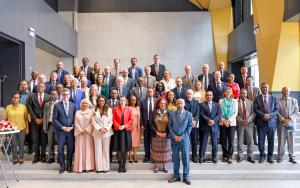
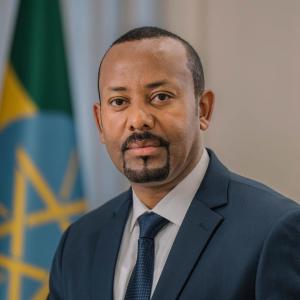









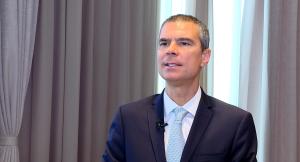
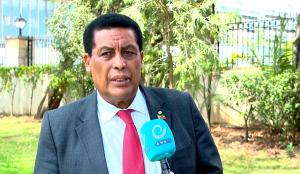
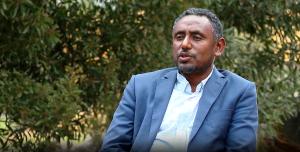
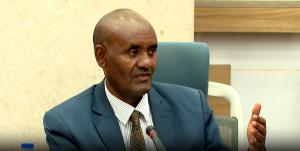
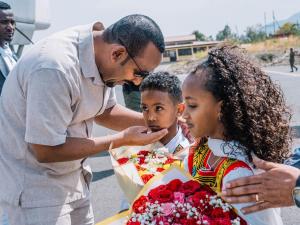
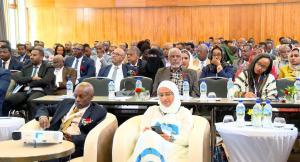

.jpg)
.jpeg)
.jpg)
.jpg)
.jpg)
.jpg)

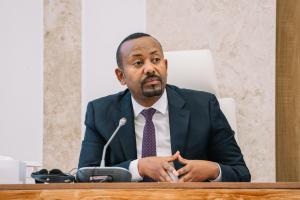
.jpg)
.jpg)
.jpg)




.jpg)
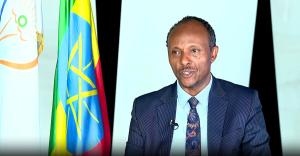
.jpg)
.jpg)

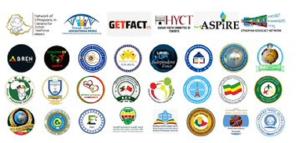

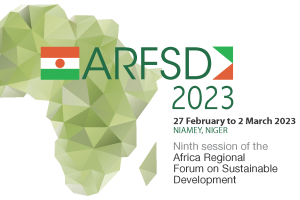
.jpg)
